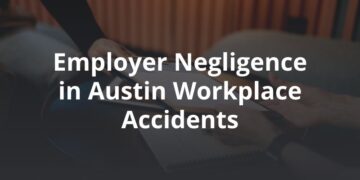There is much confusion about whether a spouse is legally liable for a deceased spouse’s debt. The confusion stems from Texas being one of nine community property states. Many people assume that because Texas is a community property state, it means it is also a community debt state.
There is no such thing as community debt. However, there are instances in which a spouse could be responsible for their deceased spouse’s debts. Knowing when you are liable for your spouse’s debts helps you protect yourself from debt collectors and creditors who might use your spouse’s death to collect a debt you do not legally owe.
The Texas statute regarding spousal liability states that a person is personally liable for the acts of the person’s spouse only if:
- The spouse acts as an agent for the other spouse; or,
- The spouse incurs debts for necessities as defined in Subchapter F, Chapter 2, where a spouse fails in their duty to support the other spouse.
In most cases, a spouse is not liable for another spouse’s debts unless they co-signed the debt, assumed the debt, or are a joint account holder. A court can also order that a spouse is responsible for the other spouse’s debt. The deceased spouse’s estate is also liable for their personal debts, which could impact a surviving spouse’s inheritance.
What Should I Do if a Creditor Demands I Pay My Deceased Spouse’s Debts?
When a spouse dies, creditors want their money immediately. They are not inclined to wait until a probate estate pays their debts. Therefore, the creditors might demand payment from the surviving spouse.
If a creditor attempts to collect a debt from you that was your spouse’s separate debt, seek legal advice before paying the debt. You might not be responsible for the debt, even though the creditor claims Texas is a “community debt” state. An attorney can review the account to determine your legal liability for a spouse’s debt.
When a spouse dies, handling the estate can be overwhelming, especially if your spouse owes a substantial amount of debt. Some debts take priority over other debts. Debts also have a statute of limitations.
The personal representative for the estate must decide which debts must be paid. The personal representative can object to debts that the person does not believe are legally enforceable.
The estate may also file a survival action and/or a wrongful death lawsuit against the party who caused the person’s death. If the estate files the action, the proceeds are paid to the estate for the benefit of the person’s heirs. Some of the proceeds of the action could be used to pay a person’s legal debts.
What Is the Difference Between a Wrongful Death Lawsuit and a Survival Action in Texas?
When a person’s death is caused by intentional acts, negligence, or wrongdoing, the surviving family members can file a wrongful death lawsuit. Only a surviving spouse, children, and parents can file a wrongful death claim. If they do not file a claim within three months or there are no living relatives in these categories, the estate can file a wrongful death lawsuit.
A wrongful death lawsuit seeks compensation for damages the family members incur because of the loss of their loved one. Damages included in a wrongful death claim are:
- Reimbursement for medical bills and funeral expenses paid by a family member
- Loss of inheritance, financial support, and value of services
- Loss of support, companionship, guidance, consortium, and love
On the other hand, a survival action seeks compensation for damages the deceased person would have been able to claim had they survived. In other words, a personal injury lawsuit survives the person’s death.
Damages in a survival action can include:
- Medical bills the person incurred between the injury date and their death
- Funeral expenses paid by the estate
- Compensation for pain and suffering the person experienced between their injury and death
- Loss of income between the injury date and the person’s death
Survival actions and wrongful death lawsuits are subject to statutes of limitations. Typically, the statute of limitations for a wrongful death action is two years from the date of death. Survival actions typically have the same filing deadline as the underlying personal injury claim.
Therefore, in addition to seeking advice regarding your loved one’s estate and debts, it is also helpful to speak with an Austin wrongful death lawyer as soon as possible. While money cannot bring back your loved one, a wrongful death action can provide funds to pay debts and expenses after your loved one’s passing. The compensation the family receives can help as they work to move forward after losing a loved one.
Contact Our Wrongful Death Law Firm in Austin, TX
If you’ve been injured in an accident in Austin and need legal help, contact our Austin wrongful death lawyers at FVF Law to schedule a free consultation with our team.
FVF Law
3101 Bee Caves Rd #301, Austin, TX 78746, United States
(512) 982-9328







